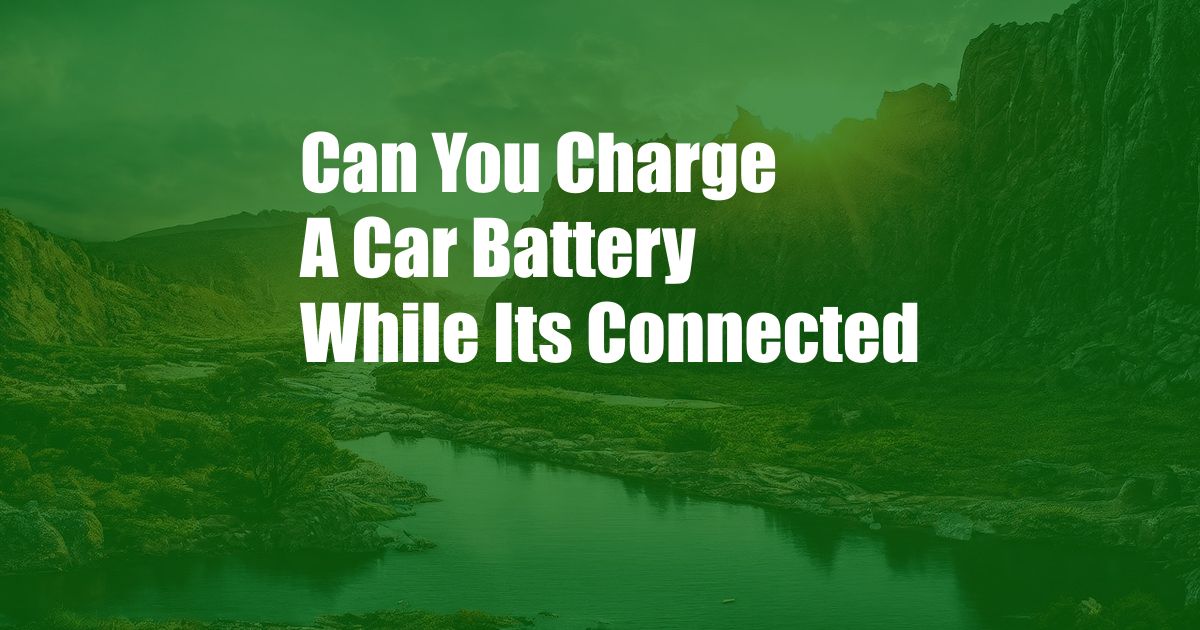
Can You Charge a Car Battery While It’s Connected?
Imagine this: You’re on a road trip, ready to explore the wonders that await. You’ve packed the car with all the essentials: snacks, maps, and a playlist to keep you company. But as you’re about to set off, your car refuses to start. The battery is dead! Panic sets in as you realize you’re stranded in the middle of nowhere. But wait! You remember hearing something about charging a car battery while it’s still connected. Could that be your saving grace? Let’s delve into the nitty-gritty and uncover the truth behind this automotive mystery.
Charging a car battery while it’s connected to the vehicle has been a topic of debate among car enthusiasts for years. Some believe it’s perfectly safe, while others warn against the potential risks. So, what’s the truth? Can you safely charge a car battery while it’s still connected?
The Benefits and Risks of Charging a Car Battery While Connected
There are both benefits and risks to charging a car battery while it’s still connected to the vehicle. Let’s weigh them up to help you make an informed decision.
Benefits:
- Convenience: It’s undoubtedly more convenient to charge a battery while it’s still connected. You don’t have to disconnect it from the vehicle, which can save you time and effort.
- Potential Time Savings: If you’re in a hurry, charging the battery while it’s connected could potentially save you time compared to disconnecting it.
Risks:
- Electrical Damage: While it’s generally safe to charge a car battery while it’s connected, there’s always a small risk of electrical damage to the vehicle’s electrical system. This risk is particularly higher if the battery is severely discharged or if the charger is not compatible.
- Battery Damage: Charging a battery while it’s connected can also damage the battery itself, especially if it’s an older battery. Overcharging can lead to reduced battery life and performance.
How to Safely Charge a Car Battery While Connected
If you decide to charge a car battery while it’s still connected, it’s crucial to follow these safety precautions:
- Use a Compatible Charger: Ensure you use a charger specifically designed for charging car batteries. Using an incompatible charger can increase the risk of electrical damage.
- Monitor the Charging Process: Keep an eye on the battery while it’s charging. If you notice any unusual noises, smells, or excessive heat, stop charging immediately and consult a qualified mechanic.
- Charge for the Recommended Time: Follow the manufacturer’s instructions for the recommended charging time to avoid overcharging.
Expert Advice: When to Disconnect the Battery
While charging a car battery while it’s connected is generally safe when done correctly, there are instances where it’s advisable to disconnect the battery first.
Here are a few situations where disconnecting the battery is recommended:
- If the battery is severely discharged: A severely discharged battery may not charge properly while connected to the vehicle. Disconnecting it will allow the charger to focus solely on charging the battery.
- If the vehicle has electrical problems: If the vehicle is experiencing electrical issues, disconnecting the battery will prevent any potential damage to the electrical system during charging.
- If you’re unsure about the battery’s condition: If you’re unsure about the battery’s condition or the compatibility of the charger, it’s always safer to disconnect the battery before charging.
Frequently Asked Questions
To provide you with a comprehensive understanding of charging car batteries while they’re connected, here are answers to some frequently asked questions:
Q: Can I charge a car battery while the engine is running?
A: It’s generally not recommended to charge a car battery while the engine is running. The alternator is already charging the battery when the engine is running, and adding an external charger can overload the electrical system.
Q: Is it safe to leave a car battery charger connected overnight?
A: Leaving a car battery charger connected overnight is generally safe, provided you’re using a compatible charger and the battery is not severely discharged. However, it’s always best to follow the manufacturer’s instructions for the specific charger you’re using.
Q: Can I charge a car battery with a solar panel?
A: Yes, you can use a solar panel to charge a car battery. However, the charging time will vary depending on the size of the solar panel and the amount of sunlight available.
Conclusion
In conclusion, while it’s generally safe to charge a car battery while it’s connected, it’s crucial to weigh the potential risks and benefits before making a decision. If you’re unsure or dealing with a severely discharged battery or vehicle electrical issues, it’s always advisable to disconnect the battery before charging. By following the safety precautions and expert advice outlined in this article, you can safely charge your car battery while it’s connected, ensuring a smooth and worry-free journey.
So, if you find yourself in a situation where you need to charge a car battery while it’s connected, remember to prioritize safety, use a compatible charger, monitor the charging process, and follow the manufacturer’s instructions. By taking these precautions, you can increase the likelihood of a successful and safe charging experience.